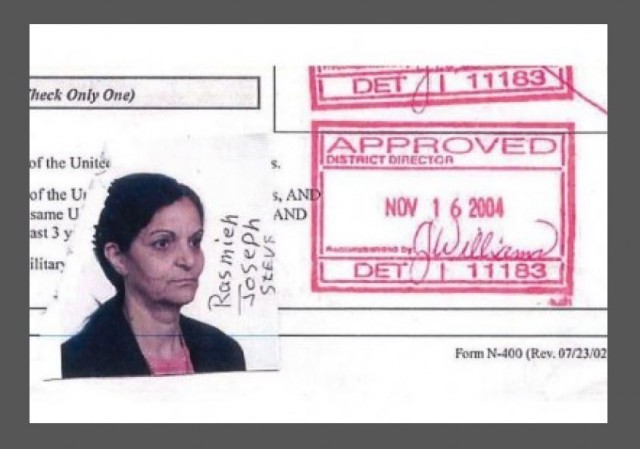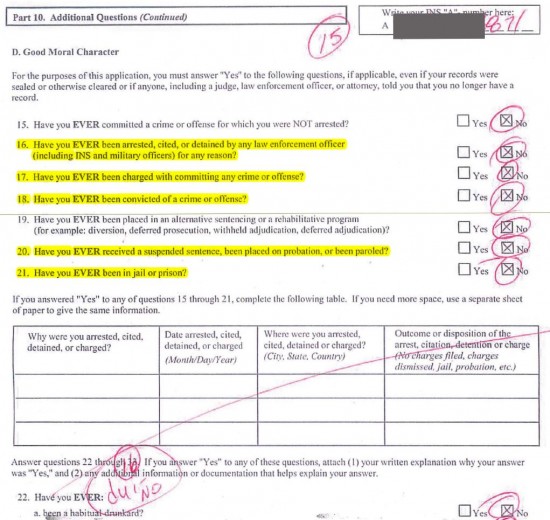Unexpected development in Rasmea Odeh immigration fraud case
Cancellation of expert hearing may be a sign the court will allow the testimony, resulting in a new trial.

We have been covering the case of Rasmea Odeh since October 2014.
Rasmea is the terrorist member of the military wing of the Popular Front for the Liberation of Palestine who was convicted in Israel in 1970 of the 1969 bombing of the SuperSol supermarket in Jerusalem that killed two Hebrew University students, Edward Joffe and Leon Kanner. Rasmea also was convicted of the attempted bombing of the British Consulate.
Rasmea was released in 1979 in a prisoner exchange for an Israeli soldier captured in Lebanon. Rasmea made her way to the U.S. in the mid-1990s, where she lied on her visa application in numerous ways, including by denying any prior convictions or imprisonment, and again in her 2003 naturalization application when she repeated the same false answers.
Rasmea was convicted of immigration fraud in federal court in Detroit in November 2014, sentenced to 18 months in prison and ordered deported after release from prison. After an appeal, the case was remanded (but the jury verdict left intact) for the trial court to determine whether Rasmea should have been allowed to call an expert witness as part of her defense. If the court rules that Rasmea should have been permitted to call the expert, Rasmea gets a new trial.
The expert would testify that Rasmea suffers from PTSD due to alleged torture in Israeli prison, and that the PTSD caused Rasmea to “filter” the simple questions on the immigration forms. Specifically, Rasmea asserts that while she remembered her conviction and imprisonment, she interpretted the questions in such a way that she didn’t understand the term “EVER” (all caps and bold on the form) to mean ever. Instead, she interepreted “ever” as meaning since she arrived in the U.S. in the 1990s.

(Yellow Highlighting Added)
As we have discussed before, this “filtering” PTSD theory is not recognized anywhere in the medical literature, and as far as we can tell, has never been asserted much less upheld in any court EVER. As such, it is not admissible, since you can’t make up science for the purpose of a case, you have to show that the science is established and reliable. See our post, Legal Analysis: Rasmea Odeh’s “expert” PTSD testimony inadmissible under clear court standards.
The prosecution made a similar point in its brief, and also made the point that the expert opinion doesn’t even pertain to the time period when Rasmea signed the forms, instead assessing her condition presently; as such the testimony, even if competent, is irrelevant. See Prosecution Theory of Rasmea Odeh’s Incentive To Lie About Being Tortured into Confessing.
A hearing in court was scheduled to take place today in which both sides were to call witnesses. The defense had argued that a hearing was not necessary and the expert matter could be decided on the papers, while the prosecution requested a hearing. The prosecution was going to have experts from Walter Reed Medical Center testify, among other things, that there was no medical support for the “filtering” theory.
The hearing had been scheduled long ago, and drove other events in the case, such as a medical examination of Rasmea by prosecution experts.
Yet in a surprise move, yesterday morning the court notified the parties and made an entry on the court docket that the hearing was cancelled and the expert issue would be decided on the papers.
Logically and legally, this should be good for the prosecution. There is no need to take in-court testimony from defense experts on a theory that is not recognized in the medical literature and does not even pertain to the time period in question. The court, on those two bases alone, can and should reject the expert.
But I have a very uneasy feeling here, and my gut tells me the judge is going to allow the testimony and grant a new trial despite the clear and compelling logic and law dictating that the testimony not be allowed. The reason I feel this way is more tactical than legal.
The judge knows that if he denies the expert testimony and rejects a new trial, there will be an appeal. The last thing the judge would want is the case going up on appeal and coming back to him for a second time.
On such an appeal, the defense would argue that it was deprived of the opportunity to present all its evidence by virtue of the court cancelling the hearing (notwithstanding the defense saying it didn’t need a hearing and the matter could be decided on the papers). To best insulate a ruling denying the expert, it would make sense for the judge just to let the defense put on its case at an expert hearing, and then reject the testimony both legally and on the facts presented at the hearing.
So, to me, the judge cancelling the expert hearing is a signal that the judge does not expect his expert ruling to be appealed. And the only way there is no appeal is if he allows the testimony, which results in a new trial.
I hope I’m wrong. I hope logic and law prevail, and the court exercises its duty to keep junk science out of the courtroom. But I have a bad feeling about this.
Expect a court ruling soon.
 DONATE
DONATE
Donations tax deductible
to the full extent allowed by law.








Comments
I hope I’m wrong. I hope logic and law prevail, and the court exercises its duty to keep junk science out of the courtroom. But I have a bad feeling about this.
Expect a court ruling soon.
Yeah, she should have been shipped out long ago and if it had been any one of us we’d be long gone.
WHAT A CROCK OF CRAP. BASICALLY, YOU KEEP APPEALING UNTIL YOU WIN.
NO WONDER WE HAVE TOO MANY ALIENS HERE.
PTSD from Israeli prison. Oh,, I’m an orphan, I killed my parents. Awwwwwwwwwwwwwwwwwwwwwwwwwwwwwwwwwwwwwwwwwwwwwwwwwwww
And I’m a lawyer, and I got no PITY for this vicious piece of human garbage.